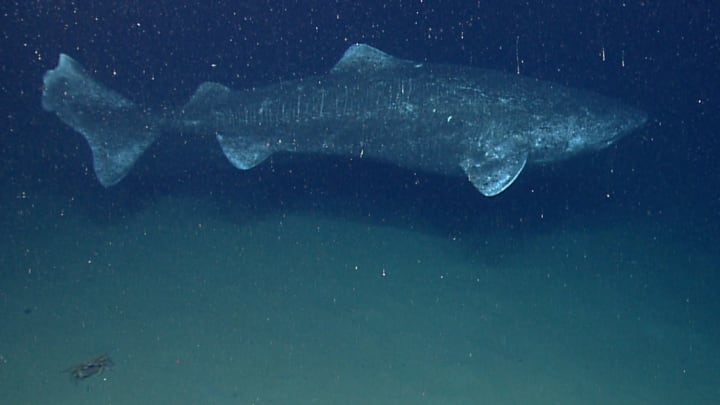Get ready to feel like a baby: There may be sharks alive today that are older than the United States. Like, much older. Researchers found a Greenland shark that’s around 392 years old—and 27 others with an average age of 272 years old. They published their findings today, August 11, in the journal Science.
Young or old, Greenland sharks (Somniosus microcephalus, literally “tiny-headed sleeper”) are extraordinary creatures. They’re the second-largest carnivorous sharks in the world, reaching 2500 pounds. Their teeth are shaped and angled to remove plugs of flesh from their prey, and their own flesh is poisonous.
Even so, Greenland sharks, like most sharks, present no risk to humans. They’re incredibly slow swimmers and live deep, deep down in the icy waters of the Arctic Ocean. These qualities make them both fascinating to scientists and tricky to track and study. And without data, it’s hard to argue that the sharks need protection.
Julius Nielsen
Previous studies had already found these sharks to have astonishingly long lives. The last estimate, based on a shark caught in 1952, concluded that they could live to be at least 200 years old.
Science has come a long way since the 1950s, and researchers decided it was time to check again. Fortunately, they had access to a good number of Greenland sharks; unfortunately, that’s because those sharks had been accidentally caught in fishing nets and scientists’ long lines between 2010 and 2013. All 28 female sharks used in the study had been fatally injured by the time they landed onboard—some by other sharks, and some by fishing equipment—and so all were euthanized. After the sharks’ deaths, researchers measured each shark and took tissue samples from the lenses of its eyes.
The scientists used radiocarbon dating on the samples to see if they could age the sharks. Once again, they had good data thanks to a bad situation—in this case, nuclear warfare. Scientists have known since the 1950s that nuclear bomb tests leave permanent molecular marks on sea creatures. Consequently, the appearance of bomb-related changes in an animal’s tissue can be seen as a sort of time stamp. But because these changes persist, even animals born after any given bomb can be marked by it if the animals they eat were alive during the test.
By combining this information with the sharks’ body measurements, the scientists were able to estimate each animal’s approximate age. The youngest sharks sampled were less than 10 feet long and under 100 years old. These were mere pups for Greenland sharks; the data suggested that these animals don’t even reach sexual maturity until they’re around 150 years old.
The oldest two sharks were 16 feet long apiece, and the scientists estimated their age at 335 (plus or minus 75 years) and 392 (plus or minus 120 years). Considering these averages, the researchers say, a conservative estimate of the shark’s longevity would put them at about 272 years old—still making them the oldest vertebrates on the planet.
Given these astonishing findings and the threats posed to Greenland sharks by commercial fishing, the authors write, it’s time we start thinking about how to protect them.
Know of something you think we should cover? Email us at tips@mentalfloss.com.
